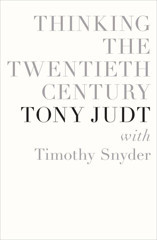
Thinking the Twentieth Century
کتاب های مرتبط
- اطلاعات
- نقد و بررسی
- دیدگاه کاربران
نقد و بررسی

Starred review from September 26, 2011
In this scintillating series of conversations undertaken as he was dying of Lou Gehrig’s Disease, British-American historian Judt (The Memory Chalet) and his interlocutor Snyder (Bloodlands) survey the triumphs and barbarities of the past century through the lens of the thinkers and ideologues who shaped it. Interleaving autobiographical sketches with fluent, freewheeling discussions of history, politics, and culture, Judt revisits crucial 20th-century intellectual currents: the impact of two world wars and the Great Depression on politics and philosophy; the development of and rivalry between communist and fascist dogmas; the success of social democracy and Keynesian economics in bringing liberal government, broad-based growth, and social equality to the post-war world; and the retreat from those achievements prompted by free-market fundamentalism’s attack on the activist state. (He also reprises his criticism of Israel after recalling summers on the kibbutz.) Judt’s ability to distill heaps of erudition into lucid, pithy conversation, even when on a breathing apparatus, is astonishing; he’s as engaging on the religious dimensions of Marxism and Freudianism as on Obama and the Iraq War. Snyder, a historian and former student of Judt’s, contributes probing interjections that stimulate and test his mentor’s ideas. The result is a lively, browsable, deeply satisfying meditation on recent history by a deservedly celebrated public intellectual.

November 15, 2011
Two brilliant scholars parse the politics and economics of the past 100 years. That could be a dry task, but for the quiet passion of Judt (The Memory Chalet, 2010, etc.) and Snyder (History/Yale Univ.; Bloodlands: Europe Between Hitler and Stalin, 2010, etc.), who spent most of 2009 talking about, in Snyder's summary, "the limitations (and capacity for renewal) of political ideas, and the moral failures (and duties) of intellectuals in politics." The authors consider these questions within the framework of 20th-century history and the biography of Judt, who died in 2010. Born in London in 1948, the son of immigrant Jews, Judt grew up with the modern welfare state, benefiting from its meritocratic educational system to attend Cambridge and pursue academic studies focused first on French history, then Eastern Europe after World War II. He was an ardent youthful Zionist who later severely criticized Israeli policies, creating a furor in 2003 with an essay arguing for a one-state solution to the Palestinian problem. Judt reluctantly took on the role of public intellectual because of a sense--clearly shared by Snyder, their conversations reveal--that the problems currently plaguing America in particular and the advanced industrial economies in general cannot be meaningfully addressed without understanding their deep roots in a history that stretches back to World War I. This history includes the ravages inflicted by unrestrained capitalism, the appeal and very similar failings of communism and fascism, the misguided uses to which the Holocaust has been put and the post-WWII social bargain that unraveled in the '70s. Judt and Snyder analyze these and many other historical issues with lofty erudition matched by unabashed polemicism--Judt skewers David Brooks as a know-nothing and characterizes Thomas Friedman's support of the Iraq war as "contemptible"). Social democracy has rarely had better-informed, more ethically rigorous advocates than these two distinguished men. For readers who like to be challenged, this searching look at our recent history provides a firm intellectual and moral foundation for understanding the dilemmas of our time.
(COPYRIGHT (2011) KIRKUS REVIEWS/NIELSEN BUSINESS MEDIA, INC. ALL RIGHTS RESERVED.)

September 1, 2011
University Professor at New York University, founder of the Remarque Institute, and the hugely distinguished author of 15 books, including Pulitzer Prize finalist Postwar, the recently deceased Judt was a major figure in public discourse. This book represents conversations he had with friend Snyder, himself no slouch; he's a Yale professor of history and the award-winning author of five books, including the recent, riveting Bloodlands: Europe Between Hitler and Stalin. The two authors range over the entire 20th century, focusing on the ideas that shaped it rather than events. It was a time when public intellectuals held sway (you could say that Judt was one of a dying breed), and here we can see how influential they were. Essential reading for anyone who purports to be well educated.
Copyright 2011 Library Journal, LLC Used with permission.

December 1, 2011
Over the past half-century, a few notable historians have garnered almost as much visibility as their subjects. In U.S. history, recent examples include David McCullough, Doris Kearns Goodwin, and Edmund Morris; in European history, Tony Judt certainly qualifies. The Cambridge-educated New York University professor, head of NYU's Remarque Institute and author of Postwar (2005), a Pulitzer Prize finalist, was diagnosed in 2008 with ALS (Lou Gehrig's disease) and died in August 2010 at age 62. During 2009, as Judt's devastating disease progressed, Yale historian Snyderwhom Samuel Moyn, in a Nation review of his Bloodlands (2010), called perhaps the most talented younger historian of modern Europe working today spent Thursdays with Tony, conversing at Judt's Manhattan home about twentieth-century intellectual history. Perhaps inevitably, their discussions featured Judt's unusual, often outsider approach to his eclectic subjects, and the genre-bending book that results combines in each chapter strong elements of memoir/biography as well as penetrating historical analysis of intellectual developments on both sides of the Iron Curtain that split Europe for two generations.(Reprinted with permission of Booklist, copyright 2011, American Library Association.)

























دیدگاه کاربران